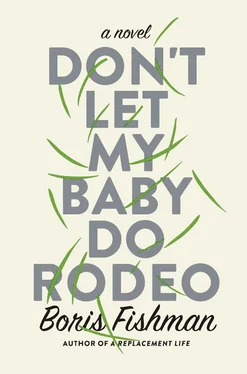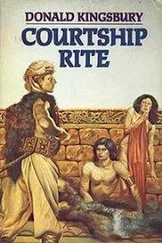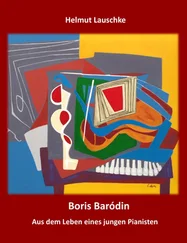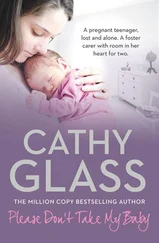“But that’s different! Alex would never — a child!”
“You don’t know the first thing about rodeo, so you think it’s not important,” Laurel said.
“No. Yes. Of course,” Maya hurried to appease her. She went back down on the grass. She got relief out of it; propping herself up required a keeping together of something that was allowed to dissolve when prostrate. “We are like castaways on an island here,” she said.“Only there’s been no accident.”
“I guess that’s why I wanted it,” Laurel said.
After a moment, Maya said: “If our form didn’t say ‘closed,’ would you have agreed to an open adoption?”
“I don’t know that,” Laurel said. “What’s done is done. We didn’t specify either way. I care he’s far, and with good people. It’s probably better this way.” Laurel stood up and ran her hands down her thighs and back, but Alex’s grass was so severely maintained that none of it had detached onto her dress. “Come on. It’s time that he met you.”
But Maya wished to keep talking to Laurel. The new information made things less understandable, not more. There was so much more to talk about — enough to justify them remaining known to each other. After a moment, Maya rose, heavier than she had gone down.
Inside, Alex was speaking to Tim with an animation that surprised Maya while Mishkin busied himself on the other side of the dinner table. “We thought you ran away together,” the adoption supervisor said on sighting the women, his mouth full of grechanniki . “You’re a genius at the stove, Maya.”
“You’ll raise him in the Jewish faith, won’t you,” Tim said, his idea of a tension-defusing subject change. He looked around the kitchen, as if he expected it to broadcast some signal of Jewishness. The boy continued to sleep in the car seat like a grocery bag that still needed unpacking.
“They might, being Jews,” Laurel said.
“We never met someone of the Jewish faith,” Tim said. “We read about it.”
“We don’t drink the blood of Christian babies,” Alex said in a failed effort at humor.
Tim regarded him with mortification.
“We are not very Jewish,” Maya rushed in. “The Soviet Union was an atheist country. That’s how we grew up.”
“We’re both fairly devout,” Tim observed. He looked over at his wife. Alex frowned. Maya wished desperately to change the subject. Tim helped by asking for the bathroom. He was over six feet and had to pull his chair far from the table before his legs could swing out. He limped away.
“What happened to the leg?” Alex asked Laurel, of whom he was slightly afraid. Laurel only grunted luridly.
“Maybe you want some time with him,” Alex said, motioning to the car seat.
“We just had forty-two hours together,” Laurel said. “The long good-bye.”
When Tim returned, the four of them stood awkwardly over the small bundle, the clock clicking from the wall, Mishkin retreated into the corner, from tact or a fearfulness of his own. Laurel broke the silence. She ran her fingers through the gold sheets of her hair and tucked them behind her ears.
“Ma’am,” she said, stepping toward Maya. Maya’s blood ran cold from the formal greeting. “This is your child. You’re the mother. You will raise him as you see fit. But I want to ask you for one thing. This is why we drove two thousand miles. I wanted to look you in the eyes and ask you. Please don’t let my baby do rodeo.” She looked at Alex, at Tim, at Maya, at her boy, hers for only the rest of this minute. Then she spun around and walked out of their lives. She hadn’t touched her son once since walking inside. And Maya understood that she had been seduced outside, apologized to and reassured and made to look at stars and hold hands, in order to become an ally — someone of whom this request could be made, and who would, through the years, honor it.
“I moved to the United States to refine my understanding of bureaucracy,” Eugene said sourly. The other Rubins buttered and chewed: Saturday breakfast. Eugene had cleaned his plate and was scratching it with the tines of his fork. “Except you can’t bribe anyone here — the government must be allowed to do a poor job without interference.” He deposited the fork on his plate with a monk’s carefulness — if he allowed disorder into his gestures, he might put the fork through somebody’s eye. He was upset because many pallets of New Zealand honey had been held up at Port Newark over a classification error. He had taken the table through the difference between C4 and C3 sugars. “Ten thousand dollars,” he said bitterly.
“Please don’t count money that hasn’t come in yet,” Raisa said. “It’s bad luck.”
“I’m sure it’s a misunderstanding,” Maya said hesitantly. “If the labels list the right number, they’ll have to—”
Eugene gave her a pitying look.
“You know better,” Maya whispered, nodding.
Eugene burped and said “Oi.” He wiped his mouth and looked at Maya. “A compliment to the cook. And no butter, unless you’re not telling the truth. With butter, everyone’s a chef.”
Maya smiled vanishingly at him.
Eugene turned to Alex and nodded at the backyard. “Those pines look like they’ve had their balls cut off. Pardon my language,” he added, making a face at Max. Then, to Alex: “Your neighbor is showing you his affection?”
“It’s deer,” Alex said irritably. Three weeks later, the argument with his wife was still with him. He had tried to dispel it with a stumpy centerpiece of hydrangea, spray roses, and carnations, which wilted amiably on the table, but it made no difference to either of them. He had done it without meaning it.
“Tie soap bars to the branches,” Eugene said. “I’ve seen people do it.”
“New Year’s all year long,” his son observed. “With Irish Spring instead of tree ornaments.”
“You have to use Ivory,” Eugene said. “Irish Spring isn’t nasty enough.”
“I do your wash with Ivory,” Raisa remarked defensively.
Mechanically, Eugene sniffed the collar of his shirt.
“There’s a spray now,” Alex said. “I just haven’t had time.” He looked at Max, who was trying to saw down the top of a cereal box with a butter knife. Alex looked back at his father. “Do you know what I found on my stoop a week ago? A ceramic deer half the size of this table. Guess who.”
“You should have put it back on his doorstep, the bastard. Sorry, Max.”
“No, I took it into the garage, smashed it to pieces, and lobbed them over the fence one by one.”
“If one of them landed on his face, he could sue you,” Eugene said. “The first lesson of revenge is you leave no marks.”
“Can we change the subject to something more pleasant?” Maya said.
Eugene shrugged and looked at the newspaper. “There’s nothing pleasant in here.”
“Then put it away, sweetheart,” Raisa said. “Speak to the table.”
Eugene obediently folded the paper and looked at Alex. “Let’s shoot one of these deer and leave that on his doorstep.”
Alex held up a pleading hand. “I’ll get the spray this weekend.”
“I’ll get it,” Maya volunteered.
The men turned to her.
“I have errands,” Maya said. “Max will come help. Right, Max? You just have to write it down, Alex, what to get.”
“Maya. .” he said. He was unprepared to contend with generosity. “You won’t get the right one.”
“There’s only one way to learn,” she said.
“Your wife is offering to do it so you can sit at home and relax,” Eugene said. “What’s wrong with you?”
Alex conceded. “It’s called DeerSanta.” He nodded. “Thank you.”
Читать дальше












